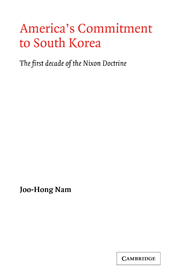Book contents
- Frontmatter
- Contents
- Preface
- Introduction
- PART ONE GENESIS
- PART TWO STRATEGY AND DOCTRINE
- 2 UNLIMITED CONTAINMENT
- 3 THE STRATEGIC IMPLICATIONS FOR KOREA OF THE NIXON DOCTRINE
- 4 THE BALANCE-OF-POWER IMPLICATIONS FOR KOREA OF THE NIXON DOCTRINE
- 5 NIXON'S LEGACY: CARTER'S POLICY OF TROOP WITHDRAWAL FROM KOREA
- 6 CONCLUSION
- Appendix I Outline of U.S. military deployment in the Western Pacific region
- Appendix II Military strength on the Korean peninsula
- Notes
- Index
2 - UNLIMITED CONTAINMENT
Published online by Cambridge University Press: 07 October 2011
- Frontmatter
- Contents
- Preface
- Introduction
- PART ONE GENESIS
- PART TWO STRATEGY AND DOCTRINE
- 2 UNLIMITED CONTAINMENT
- 3 THE STRATEGIC IMPLICATIONS FOR KOREA OF THE NIXON DOCTRINE
- 4 THE BALANCE-OF-POWER IMPLICATIONS FOR KOREA OF THE NIXON DOCTRINE
- 5 NIXON'S LEGACY: CARTER'S POLICY OF TROOP WITHDRAWAL FROM KOREA
- 6 CONCLUSION
- Appendix I Outline of U.S. military deployment in the Western Pacific region
- Appendix II Military strength on the Korean peninsula
- Notes
- Index
Summary
FROM THE LESSONS OF KOREA TO THE LEGACY OF VIETNAM
During the thirty-five years since the enunciation of the containment doctrine in 1947, perhaps nowhere has the American effort to promote peace and stability been more costly and painful than in Southeast and Northeast Asia. The two divided countries on the periphery of China – Korea and Vietnam, along with Taiwan – became the focus of America's containment policy in Asia as well as the roots of America's tragic entanglement in Asian affairs.
The unexpected Korean War had led, in turn, to an unexpected extension of an American security commitment to South Korea – a new alliance which would have been unthinkable when Truman had initially called upon the American public to undertake the responsibilities of containment in Europe. The extension of an American commitment to South Korea was, as Raymond Aron has put it, ‘an extreme interpretation of containment that implied the refusal by the United States to accept any loss whatsoever, territorial or ideological, in its Cold War confrontation with the Soviet Union.’ Such an extension led later to an even more frustrating local war in Vietnam.
In retrospect, it may be said that Korea had a revolutionary effect on post-war American foreign policy. In turn, America transformed Korea's position in contemporary history by drawing it into the mainstream of world politics. South Korea became a major operational theatre in the East Asian–Western Pacific basin.
- Type
- Chapter
- Information
- America's Commitment to South KoreaThe First Decade of the Nixon Doctrine, pp. 51 - 73Publisher: Cambridge University PressPrint publication year: 1986

